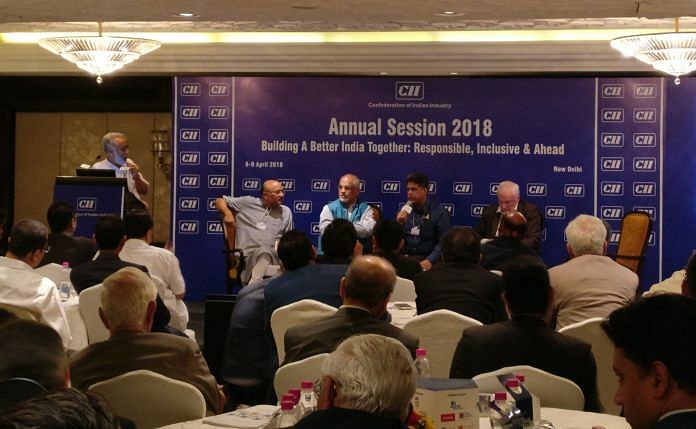BBC’s Nik Gowing talks about global trend of media crackdown; ThePrint’s Shekhar Gupta says media regulation talk comes up only when ruling party is in trouble.
New Delhi: Press regulation doesn’t work in India and it can be misused, media experts who debated the contentious issue of press freedom in the wake of the central government’s attempt to crack down on fake news, said on Monday.
T.N. Ninan, chairman of Business Standard Pvt Ltd, called the Press Council of India, which was eventually tasked with tackling fake news, “a standing joke”. “And some of its chairmen have also been jokes,” he said.
ThePrint Editor-in-Chief Shekhar Gupta agreed, saying that the Press Council’s powers were limited. Gupta said that talk about the need to regulate the media only comes up when the ruling party is in trouble. “It never comes up when they are winning elections and when they take power,” he said.
The fake news crackdown, Gupta said, is often reserved for channels and media houses that don’t actually have issues with fact-checking, and it’s the “commando comic channels” that often get away from regulators.
Ninan and Gupta were part of a panel discussion hosted by the Confederation of Indian Industry on whether the media is really neutral.
Former I&B minister Manish Tewari said that while “media regulation is a very complex subject”, self regulatory bodies are “a bit of a joke” in India. He suggested that the real need of the hour was for “content regulation to be done by the stakeholders, but embedded in a statutory framework”.
The PCI is a statutory body which regulates print media. It was set up by the Press Council Act of 1978, and consists of a chairman and 28 other members — six editors; seven senior journalists; six media managers, among others. Its primary objective is to “preserve the freedom of the press and to maintain and improve the standards of newspapers and news agencies in India”.
However, the decisions of its chairperson, Justice C.K. Prasad, to reconstitute the 13th Press Council has sparked a massive controversy. The manner with which the exercise was carried out “gives rise to doubts over the independence of the institution and its ability to play neutral umpire”, said statement issued by the Editors’ Guild.
BBC journalist Nik Gowing expanded the debate to point out an alarming global trend when it came to media crackdowns. This, he said, “is a vexing and deeply disconcerting time. And that what has happened in India is indicative of what’s happening around the world.”
He said that the digital revolution has made regulation fall behind the speed at which information is disseminated in reality. However, “there are many in the political class who now want to control the media”, he said.
The discussion was moderated by Dilip Cherian, founding partner of Perfect Relations.




No regulation – external or internal – will help if some channels find chhole bhaturey to be the most delectable news story of the day …